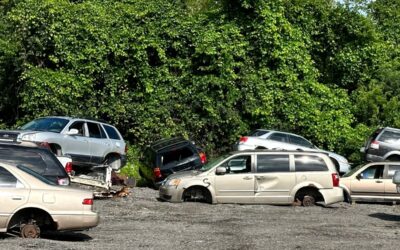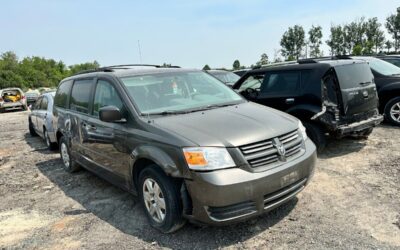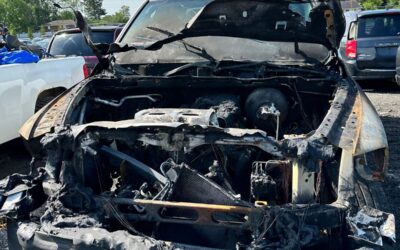Introduction
Not all vehicles are welcome at car scrapyards, and many owners only find out after being turned away. Some car scrap yards refuse certain car models and leave owners confused and frustrated. You may wonder why a car scrapyard turns away a vehicle when its main job is to recycle old and unwanted cars.
The truth is that not all vehicles have the same value in the scrap industry. Some models are harder to process, lack valuable materials, or have safety issues. Salvage yards operate based on costs, profits, and environmental rules. If a car doesn’t fit their business model, they won’t accept it.
If you are trying to scrap a car in Canada, especially in the GTA, understanding why scrapyards reject some cars can save you time. This blog explains the key reasons why some cars don’t qualify for scrapping, helping you make informed decisions when recycling your vehicle.
1. Low Scrap Value
Car scrapyards make money by selling metal and usable parts. If a car contains low-value metals or few resalable parts, a salvage yard may refuse it.
-
- Older vehicles with minimal metal content: Some newer cars use lightweight materials like aluminum and plastic instead of steel. Salvage yards prefer cars with high steel content because steel is easier to recycle and resell.
- Unpopular models: If a car has no demand in the used parts market, the junkyard won’t earn much from it.
- Electric and hybrid vehicles: These cars contain batteries and other components that are difficult to process. Lithium-ion batteries in hybrid and electric cars require a different recycling approach, making them less attractive to general car scrapyards.
2. Dangerous Materials and Safety Issues
Some car models come with dangerous materials that make them unsafe or costly to process. Auto wreckers are required to follow strict regulations when dealing with these materials.
-
- Vehicles with asbestos: Some older vehicles like classic or imported models have asbestos in their brakes and insulation. Handling asbestos requires special disposal procedures, which many scrap yards avoid.
- Flood-damaged cars: Vehicles affected by floods often have contamination issues, including mold, rust, and damaged electrical systems. Many junkyards don’t want to deal with these risks.
- Airbags and mercury switches: Some vehicles contain mercury switches and airbags that must be removed before scrapping. This extra step increases labor costs.
3. Expensive Dismantling Process
Car scrapyards look for cars that are easy to dismantle. If a car requires extra time and effort, it might not be worth the trouble.
-
- Luxury and high-end brands: Brands like BMW, Mercedes, and Tesla have specialized parts that require expert dismantling. Many scrap yards lack the tools or knowledge to process these cars properly.
- Modified vehicles: Cars with aftermarket modifications, such as custom engines or body kits, can be harder to strip for valuable parts. Some modifications can lower a vehicle’s scrap value, making scrapyards less likely to accept it.
- Vehicles with non-standard materials: Some manufacturers use non-traditional materials that make scrapping harder. For example, carbon fiber bodies are difficult to recycle, and car scrap yards often avoid them.
Also Read: Understanding the Role of Auto Wreckers in the Canadian Scrap Car Industry
4. Legal and Ownership Issues
Scrap yards require proper paperwork before accepting a vehicle. If a car’s legal status is unclear, they won’t take the risk.
-
- Missing vehicle title: If you don’t have proof of ownership, most car scrapyards won’t accept the car. This prevents stolen vehicles from entering the recycling system.
- Lien or financial restrictions: If a vehicle still has a lien or any legal disputes, salvage yards legally cannot process it.
- Out-of-province or imported vehicles: Some models from outside Canada have restrictions due to environmental regulations or legal paperwork requirements. If a car scrapyard cannot verify the vehicle’s history, they may refuse it.
5. Limited Demand for Spare Parts
Some car scrapyards operate as auto recyclers, selling used parts before scrapping the rest of the car. If a vehicle has a low demand for spare parts, the junkyard may not accept it.
-
- Discontinued models: Cars from brands that no longer exist or models with limited production runs may have fewer buyers for spare parts.
- Low resale value: If a car’s parts don’t sell well, the yard won’t invest in dismantling it.
- Unusual engine types: Vehicles with rare or complex engines may not have a strong market.
6. Environmental Regulations
A car scrapyard must follow environmental laws for scrap car removal. If your car doesn’t meet regulations, scrapyards may refuse to take it.
-
- Excessive fluid leaks: Vehicles that leak oil, coolant, or other hazardous fluids need extra work before scrapping. Many auto wreckers don’t want to handle this extra step.
- High-emission vehicles: Some older diesel or heavily polluting vehicles may not comply with environmental standards.
- Recycling restrictions: Some provinces have strict rules on vehicle recycling. If a car doesn’t fit within these rules, yards may not accept it.
Also Read: Car Recycling 101: How Your Old Car Can Help the Environment
7. Distance and Transportation Costs
Vehicle towing and pickup costs are an important factor for car scrapyards. If a car is too far or too costly to move, they may refuse it.
-
- Long-distance pickups: If the car is located too far from the junkyard, the cost of transportation may outweigh its scrap value.
- Non-drivable vehicles: If a car is hard to tow or has structural damage, scrapyards may refuse it.
Conclusion
Not every car scrapyard accepts every car. Some models don’t have enough value, contain dangerous materials, or require expensive dismantling. Legal and environmental issues also play a role in why a scrap yard might refuse a vehicle.
If you want to scrap a car in the GTA, visit your nearest car scrapyard and sell it. Greenway Auto Recycling has multiple car scrapyards all over Ontario. We accept a wide range of vehicles—whether it’s an SUV, sedan, or anything in between. Contact us to get a free quote and responsibly dispose of your unwanted car.





